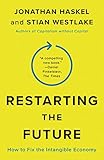Restarting the future : how to fix the intangible economy / Jonathan Haskel and Stian Westlake.
Material type: TextLanguage: English Publisher: Princeton, New Jersey : Princeton University Press, 2022Edition: 1st EditionDescription: xii, 303 pages : illustrations ; 23 cmISBN:
TextLanguage: English Publisher: Princeton, New Jersey : Princeton University Press, 2022Edition: 1st EditionDescription: xii, 303 pages : illustrations ; 23 cmISBN: - 9780691211589 (hardback)
- 0691211582 (hardback)
- 338.5
- HF 5681 H349r 2022
| Item type | Current library | Home library | Collection | Shelving location | Call number | Copy number | Status | Date due | Barcode |
|---|---|---|---|---|---|---|---|---|---|
 Libro
Libro
|
Biblioteca Juan Bosch | Biblioteca Juan Bosch | Ciencias Sociales | Ciencias Sociales (3er. Piso) | HF 5681 H349r 2022 (Browse shelf(Opens below)) | 1 | Available | 00000165821 |
Includes bibliographical references and index.
Introduction: how to restart the century
Part I. What's gone wrong, and why?
The great economic disappointment
The economic crisis is an intangibles crisis
The intangibles crisis: institutional failture
Part II. Fixing our changed economy
"The progress of science and useful arts": reforming public investment and intellectual property
Financial architecture: finance and monetary policy in an intangibles-rich economy
Making cities work better
Reducing dysfunctional competition
Conclusion: restarting the future
"Restarting the Future argues that the big economic challenges facing the world are the result of our failure to deal with the implications of an economy dependent on knowledge, ideas and relationships. It examines why making this transition is so hard, and looks at ways forward in the fields of public policy, business and finance. The troubling state of rich-world economies (low productivity growth, high inequality, populist instability, climate crisis) is significantly the result of the troubled and incomplete shift to a new type of economy - specifically, the move from an economy dependent on tangible capital to one dependent on intangible capital. At the heart of the problem is a significant slowdown in the pace of intangible investment since the financial crisis. (There were some early signs of this at the time the authors were writing their previous book, Capitalism without Capital, but new data now makes the severity and persistence of this slowdown clear.) This slowdown has happened because we lack the right institutions and strategies to encourage intangible investment and channel it effectively. What is more, there are significant groups with an interest in stopping these new institutions emerging. Contrary to the dominant narrative that focuses on the tension between a successful, future-facing "elite" and a mass of low-status "left-behinds", the authors argue that many of the people and organisations with an interest in holding back the future are affluent and high-status, including affluent retirees, established financial institutions and graduate knowledge workers. Haskel & Westlake survey attempts to fix these institutional problems, explaining how they work in the context of the intangible economy, and what the upside to solving them might be. They describe interesting and topical policy experiments and business strategies (such as Preston's Local Economic Strategy, or topical new business models like WeWork and CloudKitchens) and set them in a novel economic context. (Specifically, these sections look at city policy, business finance and investment, public investment, competition policy, monetary policy, mitigating climate change and business strategies for tangible-based firms. The authors close the book with a political programme for how to get over the teething troubles of the new economy"-- Provided by publisher.
Description based on print version record and CIP data provided by publisher; resource not viewed.


There are no comments on this title.